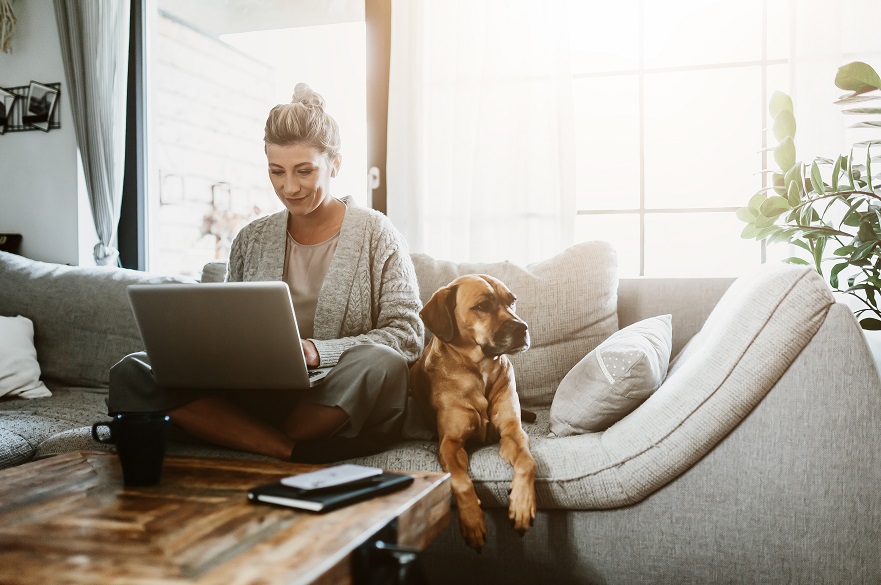Expert blog: pandemic pets – a pleasure or peril?
By Dr Jacqueline Boyd, animal scientist in the School of Animal, Rural and Environmental Sciences
Published on 13 June 2022
Categories: Press office; Research; School of Animal, Rural and Environmental Sciences;

If you live with a pet, how did the pandemic affect your relationship? Were they a source of comfort? Or were they a worry?
When the first COVID-19 lockdown was announced in the UK, my initial response was of crushing anxiety. Being told that I was only to leave the house for ‘essential’ reasons and that it should only be once a day was not just a restriction on my liberty (albeit at the time for good reason), but more importantly for me, on the liberty of my dogs.
Throughout the pandemic, pets attracted attention. Many thought pets were protective against some of the fears, anxieties and worries that ensued.
But were our pets a pandemic pleasure, or more of a peril? Were they good for us and were we good for them?
The Pet effect
Anecdotal and published research repeatedly indicate that those living with pets are convinced their pets are good for them and their wellbeing – physically, mentally, emotionally and psychologically. Animal-assisted therapies are commonly touted as alternative ways to ‘treat’ and manage a myriad of conditions and complaints from depression to addiction. Pets have even been ‘prescribed’ by physicians to support those with mental illness, to encourage people to exercise and to benefit from the companionship and social lubricant effect of interacting with animals.
Pandemic pets
Pet acquisition boomed in the pandemic and many people with pets said they were ‘lifesavers’. Memes flooded social media of family dogs hiding from ‘yet another daily walk’ with a family member.
Working from home mandates meant that people were spending more time with their pets than ever. For those living alone, the presence of a pet meant that social connection and touch with another living being was possible.
I live with five cocker spaniels – a clear lifestyle choice, but one that I freely admit helps me. Physically, they are superb personal trainers – we walk and run miles each week. Mentally, they mean that rain or shine, I am outside for at least part of the day. Emotionally, they provide non-judgemental companionship and comfort. Professionally, they are my muses, as well as my inspiration.
During the various pandemic lockdowns, we exercised, spent time in the garden (therapy in itself), watched hours of Netflix and ‘buddied’. It was great. I think they helped me, and I hope I helped them.
So, on the face of it, pets are good.
But research conducted during the pandemic has challenged this common narrative. Evidence increasingly suggests that living with pets might not be the panacea of all ills. Indeed, mental wellbeing for those living with pets is not necessarily better than those without. So, what is going on?
Pandemic pet perils
On reflection, the stress and worry I felt during the first UK lockdown primarily centred around my fear that I would be unable to care for my dogs appropriately. What if we needed a vet? What about their exercise and training? Was my job safe and could I afford to keep them?
It turns out, I was not alone in these worries.
There was worry about how to care for pets if people became ill. Others abandoned their pets when evidence of pets having positive COVID-19 tests were reported in the media. Vets and para-veterinary professionals had to radically alter how they cared for their clients – two and four legged.
People with dogs were lonelier than those without – possibly due to isolation. Indeed, multiple studies examining data collected during the pandemic have failed to support the common belief that pets are good for people and that mental health was not uniformly better in those living with pets.
Pets themselves also seemed to suffer in some cases, with behavioural changes being reported – consistent with signs of stress. Emotional contagion is also recognised as a particular issue – essentially stressed people can result in stressed pets. There is even a residual concern about the behaviour and health of pets acquired during the pandemic, who have missed out on the more typical early life experiences.
What have we learned?
Society changed because of the pandemic. Work, life, leisure and health have all been affected. Our pets, our relationships with them, and our understanding of our interactions with them have too. Far from being a universal guarantee of supporting human health and wellbeing, the pet effect is much more nuanced than we previously appreciated.
It appears that many (myself included) believe pets were positive during the pandemic. But the perils and problems have also been noted and are possibly more significant than previously appreciated.
The pet effect paradigm is shifting. We must recognise the disparity between expectations and reality of our interactions with pets to support the health and wellbeing of them and us.
Pets are good for us - sometimes. We also need to consider if we are good for pets.